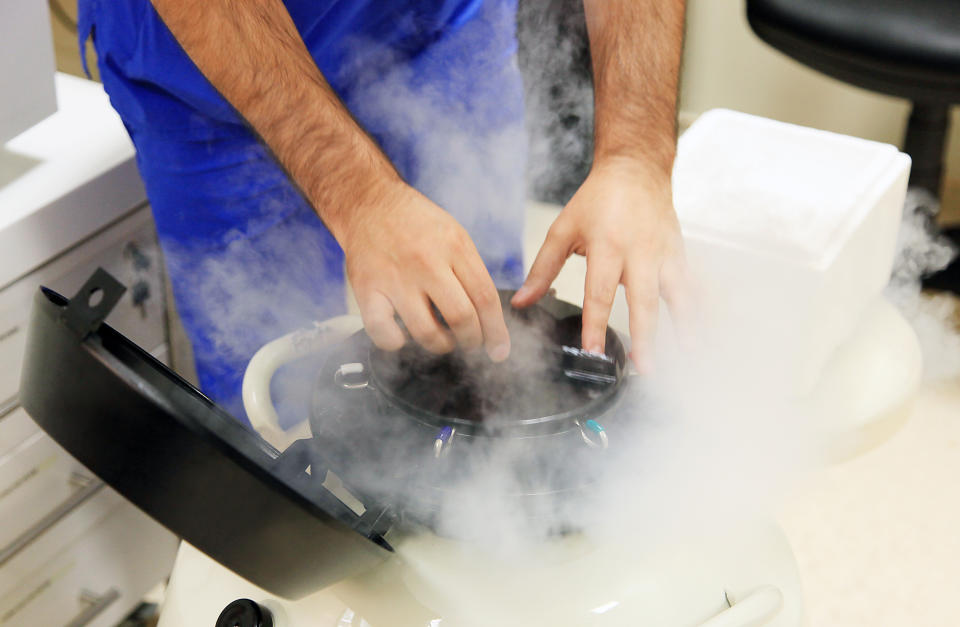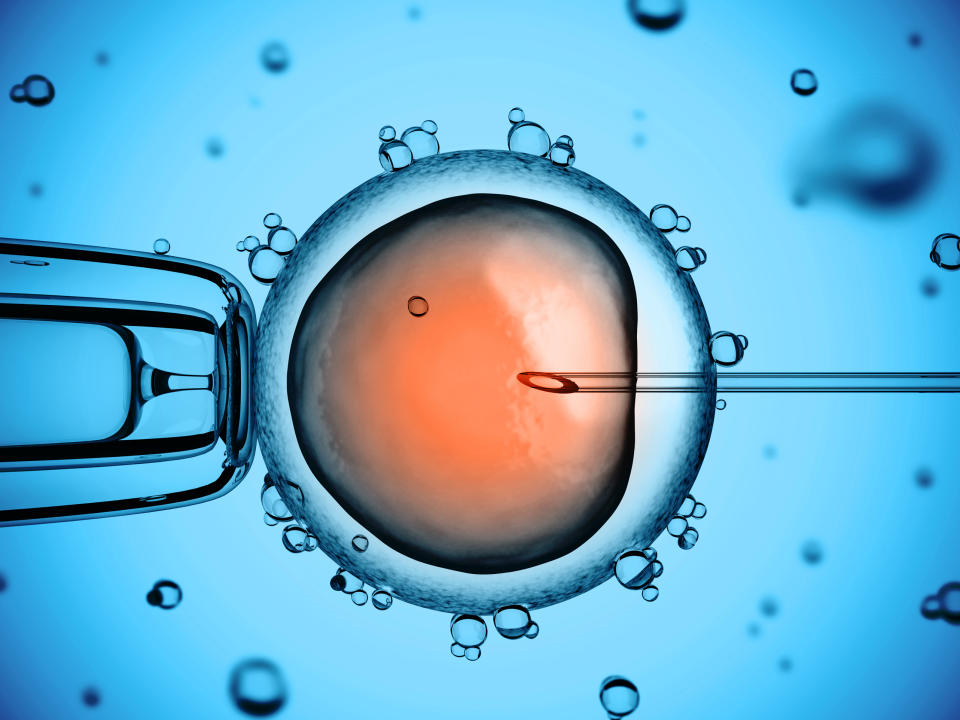How to freeze your eggs (and sperm) as 60% of under-35s are delaying having children
Some 59% of under-35s are delaying or deciding not to have children, new research shows.
This newer attitude means two-thirds (66%) of this age group would consider freezing their eggs, sperm or embryos – if they could afford it.
Financial concerns including the rising cost of living and childcare are the biggest reasons prompting UK adults between 18-25 to delay starting a family. But in a catch-22, despite an increase in interest, the price of certain procedures means they aren't often viable.
For women, egg freezing success rates vary by retrieval age, declining as you get older. For example, if you freeze 20 eggs before 35, your chances of having at least one baby is 90%, compared to just 51% if you store the same number before 40.
"It’s clear that many people in their twenties and thirties, those who might be considering having children in the next few years, are more than aware that prolonging their fertility can be a good option. But it’s not really an 'option' unless you can afford it," says Jenny Saft, co-founder and CEO at Apryl, which commissioned the research.
"It’s an impossible bind, and the perfect financial storm which is likely to take a significant emotional toll on the couples and individuals whose family plans are being derailed by financial matters.
"It’s also likely to have broader social and economic implications for society: people are already having fewer children, and having children later, and we are faced with a rapidly aging population."
Read more: Baby born to cancer survivor who had an immature egg frozen five years ago

While she's aware no one-size-fits-all, Saft has called for new ways for people to access and afford effective fertility care.
"With demand on fertility services only set to increase, and access to support on the NHS severely limited in the UK, we need to ensure seeking fertility treatments does indeed feel like a viable and empowering 'choice' for all those who need it," she adds.
Freezing healthy sperm or eggs when young can extend the period that couples and single people can conceive, and can also help with fertility issues which are more likely to increase with age.
So, here's a look at everything currently involved in the egg and sperm freezing process, from costs to potential success rates.
Read more: As Jennifer Aniston shares IVF journey, how does the fertility treatment work and who's eligible?
Egg freezing: the facts
Why women freeze their eggs
A woman’s fertility naturally declines with age, with the number and quality of her eggs both dropping.
But this is not stopping the growing number of women choosing to become mothers later in life. According to the Office of National Statistics, in 2021 there were 28,478 live births in England and Wales in women aged 40 to 44, this represents 4.6% of the total number of live births, up from 3.9% in 2016.
Some delay having children simply because they have not met the right partner. Others may not be financially stable enough to raise a child or may prefer to progress further in their careers before becoming a mother.
Others have concerns over loss of independence and climate change.
Medical treatments, like chemo or radiotherapy, can also cause infertility, prompting many patients to freeze their eggs ahead of the intervention.
A transgender person who is transitioning may also choose to preserve their fertility before starting hormonal therapy or reconstructive surgery.
Watch: Getting pregnant after 35: US research says reproductive years now extend to 37
What does egg freezing involve?
The egg freezing process typically takes between two and three weeks. A woman is first tested for any infectious diseases, like HIV.
An HIV+ patient can still freeze their eggs, however, they must be stored away from others’ to prevent contamination.
They then start IVF, which involves up to two weeks of hormonal injections to stimulate the ovaries to produce multiple eggs.
When ready, the eggs are collected under general anaesthetic or sedation. Most women have around 15 eggs collected, however, it may be less for those with naturally low numbers.
Unlike IVF, the eggs are not then mixed with sperm but are instead added to a freezing solution. Vitrification, or fast freezing, may be more effective than the traditional method of cooling eggs slowly, research suggests.
Eggs frozen “electively” are then stored in liquid nitrogen.
How long can you store your eggs?
The rules on how long you can store eggs, sperm or embryos has recently changed. Before 1 July 2022, most people could usually only store their eggs, sperm or embryos for up to 10 years. Only if they had premature infertility or were going to be having medical treatment which could affect their fertility, could they store for up to 55 years.
The law now permits you to store eggs, sperm or embryos for use in treatment for any period up to a maximum of 55 years from the date that the eggs, sperm or embryos are first placed in storage.
However, crucially for storage to lawfully continue you will need to renew your consent every 10 years.
When ready for use, the eggs are thawed. Surviving ones are then injected with either a woman’s partner’s sperm or that of a donor, via a process called intracytoplasmic sperm injection (ICSI).
ICSI is necessary due to freezing making the outer coating of eggs tougher, with sperm being less able to penetrate the cell during IVF.
If fertilisation takes place, the embryo is then transferred into the womb in the hope it will lead to a healthy pregnancy.
Read more: Single mum who had IVF baby at 50 says it was right time to become a parent

When to freeze your eggs
When it comes to freezing your eggs, age is the single most important factor for success, according to the HFEA.
The organisation’s report Should I freeze my eggs?, states if a woman has the procedure at under 35, she will be more likely to conceive using these eggs than if she tried to become pregnant naturally, particularly from 40 and over.
To maximises their chances of success, older women often use frozen donor eggs rather than their own.
In the UK, it is illegal for a donor to be paid anything more than expenses, which are capped at £750 per donation 'cycle' (a donation cycle is one complete round of treatment, at the end of which the eggs are collected and donated).
The donor has no rights or responsibilities in raising or financially supporting the child and is not mentioned on the birth certificate.
When the child reaches 18, however, they can find out their donor’s name, date of birth and address, and make contact if they wish.
Read more: Major breakthrough on fertility treatment for lesbian couples
Is egg freezing safe?
Egg freezing is generally considered very safe, according to the HFEA. Some women may experience mild side effects from the hormonal injections, like tenderness at the site of the injection.
A third (33%) of those having IVF develop ovarian hyperstimulation syndrome (OHSS), with just over 1% of cases being moderate or severe, Royal College of Obstetricians & Gynaecologists (RCOG) statistics show.
OHSS comes about when the body overreacts to the fertility drugs used during IVF. The overstimulated ovaries swell and release chemicals into the blood.
Fluid from the blood vessels then leaks into the abdomen, and even sometimes into the heart and lungs. A small number of deaths have been reported, the RCOG reports.
Mild cases usually get better on their own, however, if a woman is vomiting, passing little urine or battling chest pain, she should go to hospital.
There is no specific treatment for OHSS, however, anti-sickness drugs and IV drips can replace fluids lost by vomiting.
The cost of freezing your eggs
A select few are eligible for egg freezing on the NHS. For example, cancer patients about to start chemotherapy may be offered the procedure depending on where they live, according to the HFEA.
The rest usually have to foot the bill themselves, which can be costly.
According to the HFEA, the average cost of having your eggs collected and frozen is £3,350, with medication being an added £500-£1,500.
Storage costs are extra and tend to be between £125 and £350 per year.
Thawing eggs and transferring them to the womb costs an average of £2,500. So, the whole process for egg freezing and thawing costs an average of £7,000-£8,000.
Sperm freezing: the facts
Men are now able to freeze their sperm when young to use in their own future fertility treatment or even as an option to donate to someone else who requires a donor.
The team at London Andrology have put together some key facts about the sperm freezing process.
How it works
Once you have chosen a clinic, you will be invited in for an appointment to be tested for any infectious diseases such as hepatitis.
Positive results even for HIV do not have any bearing on whether your sperm is frozen it just impacts how your sperm is stored.
Following the initial appointment, you will then be asked to produce a fresh sample of sperm, which will be mixed with a special fluid called a cryoprotectant, which protects the sperm from damage during the freezing process.
Before freezing, the sperm sample will be divided between a number of containers called straws. It is separated so that the sperm can be used in multiple treatments.
Once the samples are ready to freeze, they are cooled slowly at first and will then be plunged into liquid nitrogen.
How long can sperm be stored?
On 1 July 2022, the rules on how long you can store sperm changed. Before then, most people could usually only store sperm for up to 10 years.
The amended law now permits you to store sperm for use in treatment for any period up to a maximum of 55 years from the date it is originally frozen.
However, for storage to lawfully continue, you will need to renew your consent on your frozen sperm every 10 years.
Read more: Endometriosis Awareness Month: Fertility experts bust four common myths about the condition
What happens when I want to use my sperm?
Once you have decided to use your sperm you will then need to discuss with your clinic the different options for fertility treatment such as IVF or IUI.
Once your sperm has been thawed, it will be used in exactly the same way as fresh sperm is used for any fertility treatment.
Sperm freezing success rates
Treatment with frozen sperm for any fertility treatment is just as successful as treatment using fresh sperm.
Sperm freezing costs
The fee varies hugely from clinic to clinic, so it is important to do your research and make sure you choose the right one for you.
Many clinics offer an initial ‘first freeze’ and one year's storage which is usually a few hundred pounds. If you are looking to store your sperm for multiple years or even 10 or 20 years potentially then it is important to discuss the annual fee with your clinic before going ahead.
It is almost impossible to move your sperm from your chosen clinic once frozen. Discuss how it is stored and who the third party is that is storing the sperm (if there is one) and what would happen for example if the clinic was to close.


